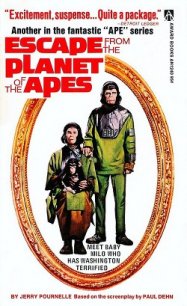Conquest of the Planet of the Apes - Jakes John (читать книги без txt) 📗
Armando began to hand flyers into the booths, using his standard patter. Caesar searched for Lisa, noting in the process that the operators working on the customers were female chimpanzees.
At last Caesar spotted the girl chimp. She was standing near the last booth. He heard a raspy female voice say: “All right, Lisa. The book. Then home.” A ringed hand extended from behind the partition in a peremptory way.
Lisa carefully placed the book into the hand of her mistress; turned up the aisle to leave. She saw Caesar. She hesitated, her eyes registering surprise and what Caesar took to be pleasure. He could barely keep himself from making some sign to her. Armando tugged gently on the leash.
At the same time, the harridan face of Mrs. Riley popped into sight from behind the partition. “Lisa, did you hear me? I said home!”
At once the girl chimp started forward. She passed Caesar with another lingering glance.
Armando insisted on proceeding down the line of booths, offering a handbill to each lady. Some took them. Others waved the offering away disdainfully. Mrs. Riley was one of the latter. Peering into her booth, Caesar saw a female chimpanzee working on Mrs. Riley’s orange-tinted coiffure with a hand drier.
Armando shrugged philosophically at the rebuff, about to start back up the aisle when he, as well as Caesar, was caught by a sudden change in the chimp attendant’s expression.
It became simple, almost comically so. The attendant bent forward, began to pick and search through Mrs. Riley’s hair. When the chimp found something, Mrs. Riley dropped her book and shrieked.
“Oh, dear, what’s happening?” cried Mr. Phyllis, fluttering toward the commotion.
Mrs. Riley looked too stunned to cry out again. From her fingers, the chimpanzee attendant was daintily eating whatever it was she had found on her customer’s head.
Amused, Caesar mentally filed another fact about the society into which he’d been precipitated today. Despite an immaculate facade, the humans were not as clean as they looked.
Mr. Phyllis’s face was a study in pink, petulant rage: “No, Zelda—no!” And once again, Caesar saw that horrible reaction: terror in the eyes, cringing, cowering. Mr. Phyllis stamped his foot and pointed. “You nasty little beast—home!”
Mr. Phyllis snatched the drier from the offender’s hand. As the chimp left through a rear door, Mr. Phyllis tried to placate Mrs. Riley: “I’m so terribly sorry! I’ll have someone come right along to finish you.”
“You’d better, or I’ll take my business to a shop where those stupid beasts are properly conditioned!”
Mrs. Riley’s tone was so ugly that it completely erased pleasant memories of Lisa from Caesar’s mind. He was plunged back into his earlier mood of stunned rage. The mood returned when he and Armando encountered Mrs. Riley again an hour later.
She was seated with a gentleman ten years her junior at a corner table of a restaurant. Her coiffure now complete, Mrs. Riley drained her demitasse and clutched the young man’s hand.
“Thursday, then?” Caesar overheard. “The same place?”
“Yes, I’ll try to make it,” the young man said casually. Mrs. Riley looked unhappy as both rose to leave.
The young man snapped his fingers. “Hang on, I forgot the busboy’s tip.”
“Let me get it,” Mrs. Riley said, adding with a touch of sarcasm, “After all, Charles, why should we vary the pattern?”
From her purse she took a small package. She handed it to the young man. Distributing handbills two tables away, Caesar tried to identify the brightly printed box but could not.
He put down a flyer, moved to the next table. Two obviously prosperous black men sat talking, oblivious to the white-jacketed captain preparing crepes suzette on his cart. Beside the captain stood a young chimp busboy, studiously watching the human hands manipulate the chafing dish.
“—real future’s in hydroponic farming,” one of the men was saying. “I was telling my son last night—”
“Oh, for God’s sake, Harry, why steer him into something like that? The big money’s in synthetic alloys—”
Caesar laid a handbill between them. The first man picked it up, gave it one look, tossed it aside as his friend argued. “If you’re selling to the government. But look what’s happened to the space program. Cut to the bone.”
“It’ll come back.”
“Oh? That’s what you said about the supersonic transport, Harry.”
Caesar paused at an empty table, pretending to examine his remaining handbills. Mrs. Riley’s friend signaled the busboy, who hurried to him. The young man tipped the package. Six or seven small, wrinkled things dropped into his palm. Caesar craned to see. Raisins!
Smiling condescendingly, the young man tipped his hand, spilling the raisins into the busboy’s outstretched fingers. With an almost witless look of joy, the chimp immediately carried all the raisins to his mouth and ate them in a gulp. Looking amused, the young man strolled back to his feminine companion. Caesar was disgusted by the mindless pleasure on the busboy’s face.
The young chimpanzee turned back toward his captain just as the latter, chafing dish in his left hand, used his right to apply a lighted match. With a whoosh and a leap of flame, the alcohol in the dish caught fire—and the chimp let out a cry of fright. He dashed for the street, crashing past Mrs. Filey and her friend, before the enraged captain roared the familiar command, “No!”
Silence in the restaurant. The two black men looked annoyed. Mrs. Riley was fuming, brushing off the sleeve of her jostled companion. But Caesar could see only the busboy.
He had stopped short, hearing the captain’s command. Slowly, he turned around. Caesar was sickened by the abject fear in the chimp’s eyes.
The captain pointed to the floor beside his foot. “Here.”
Trembling, the chimp took two steps, stopped again.
“Damn you, I said here!” the captain exploded. But the busboy would come no closer, alternately eyeing the flaming chafing dish, now back on its stand, and the captain’s infuriated face.
“I apologize, gentlemen,” the captain said to the annoyed customers. “All our waiters and busboys are supposed to be thoroughly conditioned to fire when we buy them.”
“Well, Ape Management screwed up on that one,” said one of the men.
Caesar again went rigid with anger. What was this conditioning?
Whatever it might be, it was evidently responsible for the cringing of the chimp busboy. The burning crepes suzette cast eerie reflections in his huge, still-fearful eyes.
A forceful tug of the leash drew Caesar out of the restaurant. Armando realized his ape companion was nearing the breaking point.
An hour later, Caesar and the circus owner were distributing the last of their handbills in a smaller but no less imposing plaza which they had reached via a boulevard from the larger one. They stood near an illuminated information board, Caesar listlessly watching the crowds and fretting at the inescapable piped music from hidden loudspeakers.
Perhaps Armando also regretted his decision to enter the city. He no longer gave a little talk with each handbill, merely thrust it out.
Caesar understood that the various gleaming high rise buildings fronting the smaller plaza must all be connected with the government. The illuminated panel at the top of the information board identified the complex as Civic Center, but he was too exhausted and miserable to devote any interest to the long list of bureaus, agencies and departments listed below.
The angle of the sun slanting through adjoining streets indicated that the afternoon was almost gone. Caesar was grateful. He wanted nothing more than to be aboard the helicopter, on his way back to the familiar environment of the circus. He wanted to leave the shock of today’s discoveries behind, even though he knew they would remain in his memory forever.




